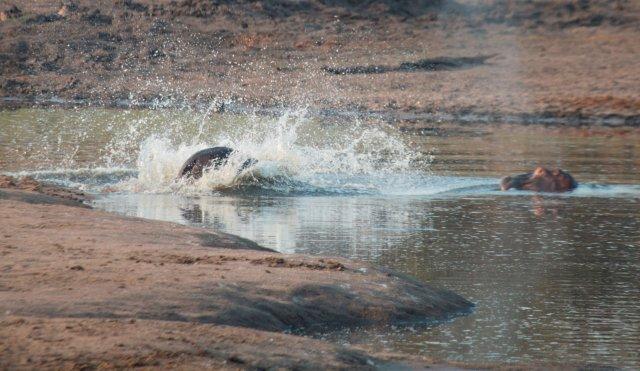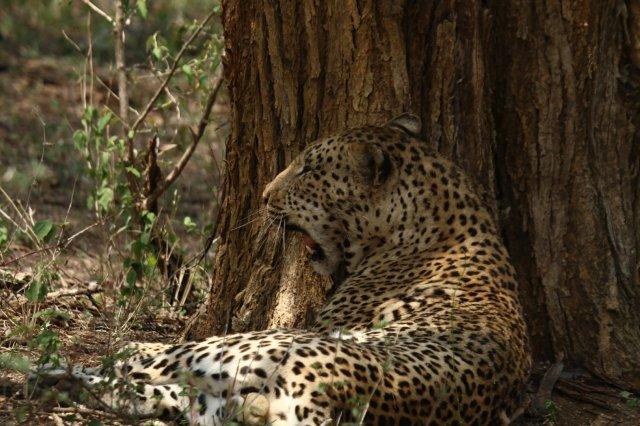We were lucky to see so many animals and Birds including the big 5 and it was a memorable and an unforgettable experience.
The Pilanesberg Game Reserve is located in North West Province in South Africa, west of Pretoria. The park borders with the entertainment complex Sun City. The park is currently administered by the North West Parks and Tourism Board.
The area is fringed by three concentric ridges or rings of hills, of which the formation rises from the surrounding plains. Pilanesberg is named after a Tswana chief, Pilane,[1] the 'Pilanesberg Alkaline Ring Complex' is the park's primary geological feature. This vast circular geological feature is ancient even by geological standards as it is the crater of a long extinct volcano and the result of eruptions some 1,200 million years ago. It is one of the largest volcanic complexes of its type in the world, the rare rock types and formations make it a unique geological feature. A number of rare minerals occur in the park. Pilanesberg Game Reserve rates high amongst the world's outstanding geological phenomena
Wilder beast
Zebras
Very playful
Most of the time one can see a heard of Elephants and they like to play with each other often
A Water buck

These red billed Ox pecks are very common on these animals and mutually benefiting
Giraffes are also a common site
Young Kudu
This White Rhino we saw towards the evening
Kruger National Park is one of the largest game reserves in Africa. It covers an area of 19,485 square kilometres (7,523 sq mi) in the provinces of Limpopo and Mpumalanga in northeastern South Africa, and extends 360 kilometres (220 mi) from north to south and 65 kilometres (40 mi) from east to west. The administrative headquarters are in Skukuza. Areas of the park were first protected by the governme of ent of the South African Republic in 1898, and it became South Africa's first national park in 1926.
The notable thing is that Kruger is almost 1/3rd of the size of Sri Lanka.
The park has an area of 572 square kilometres (221 sq mi). One can travel through in a standard road vehicle as although most of the 188 kilometres of track are not surfaced, they are well maintained. The three main tarred roads are named Kgabo, Kubu and Tswene. There are several camps serving the park from the outside, such as Bagatla and Manyane. Several lodges are situated within the park itself. For the day visitors there are several stops on the inside where there are bars and gift shops. Towards the centre of the park there is an artificially constructed lake, the MankweDam, and Thabayadiotso, which means "the Proud Mountain".
This one looks intimidating with it's very large ears

Like Deer in our parks these Impala's are very common
this is the 2nd Leopard we saw in Kruger
These sites are very common
A male Lion
These Elephants look very intimidating even if they are calm with these large ears
Seeing Lions was a rare treat
Sometimes you get to see these Wild Buffaloes in numbers
A Kudu
Hippos are every where
A water Hog
A Baboon
We were very lucky to see this Leopard at close range
A sleeping Hyena
This crocodile came to the river bank with this huge fish
An African Iguana

These Rhinos were seen at a private park belonging to a petrol station and a shopping complex
A Bontebok Antelope

Famous Sun city
They have got a five star hotel, a casino. malls etc and an amusement section with this artificial strip of sea which is amazing
Water fountain inside Moneicasino
Ariel photo taken from the tallest building in Africa the Carlton Building
Breathtaking views in Nmupalanga about 150 KM from the nearest gate to Kruger park.
natural wonder called “Bourke’s Luck Potholes”. These Potholes have been formed over decades, due to the water that swirls over the rock formations t
The Blyde River Canyon
The Blyde River Canyon is the largest green canyon in the world, thus making it one of the most visited attractions in South Africa. There are three ways in which you can visit the Canyon: from the viewpoints at the Three Rondavels, white river rafting, flying over it with a helicopter or in a microlight.
Waterfalls
In Mpumalanga, there are tons of waterfalls, which are worth visiting like the Horseshoe Falls, the Lone Creek Falls, the Mac-Mac Falls, the Lisbon Falls and the Berlin Falls.

God’s Window
God’s Window has no frame, no glass and no handles; it is simply a view so magnificent. God’s Window has a panoramic view of: the Lowveld, over Mountains, River and Waterfalls




































































No comments:
Post a Comment